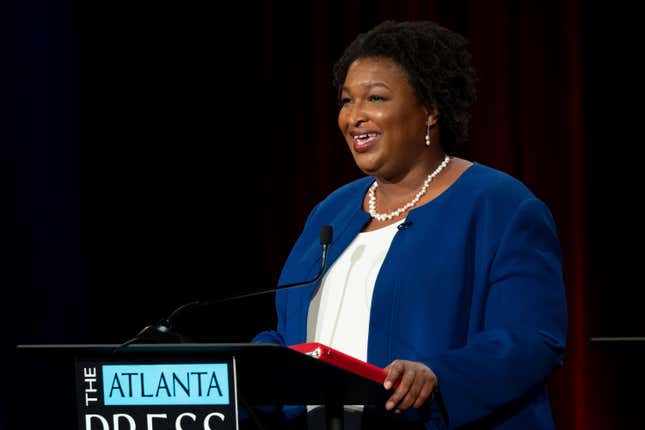
As debates go, Monday’s Georgia gubernatorial standoff between Republican incumbent Brian Kemp, Libertarian Shane Hazel and Democrat Stacey Abrams was tame. No personal insults, a la Trump v. Clinton or Trump v. Biden. No against-the-rules prop badges, as-in Walker v. Warnock last week. With nearly the full hour elapsed, the biggest drama was Hazel’s griping that he wasn’t getting as much time as his opponents.
Then, something happened that’s out-of-place in America’s gutterbutt politics of 2022: Abrams apologized for interrupting Kemp during the debate. It came after probably the most heated exchange of the evening, in which all three candidates went back and forth over gun laws (and, ironically Kemp and Hazel argued that gun restrictions hurt Black folks’ ability to protect themselves in a violent society). As Kemp rebutted Abrams’ claim that he killed background checks for gun owners in the state, both Hazel and Abrams butted in, but it was only Abrams who Kemp admonished.
“Miss Abrams, I have not interrupted you tonight,” he said, ignoring the fact that Hazel also talked over him. When the next and final question of the night was asked, Abrams prefaced her answer with, “Let me again apologize to Mr. Kemp for interrupting. This is a very important topic to me and I apologize for my outburst.”
Thing is, it wasn’t an outburst; it was completely in line for a candidate fighting for her political future before the people of the state she wants to lead. Debate rules may have called for candidates not to interrupt one another, but when’s the last time that happened? Moderators and participants being interrupted by one another, candidates blowing way past their allotted time for answers or rebuttals and testy, if not disrespectful exchanges are what modern political debates are made of. Abrams’ apology was noticeable mainly because we’ve come to expect a spectacle, not civility.
That’s not to say I hold the apology against Abrams, who I’ve interviewed twice and who served as minority leader in the Georgia State Assembly when I lived there. She’s a brilliant politician with the ability to disarm or shut you down whenever necessary, skills she pointed to during the debate as necessary for a Democrat in a leadership position in a majority-red legislature. I’m certain her apology was more out of respect for the moderators and the process than anything else. Abrams, to borrow a phrase from my favorite football coach, needs no endorsement from me. She wants to win, and knows she’ll have to throw some sharp elbows in the next few weeks of the campaign to pull it out.
Still, it was distasteful watching two white men appear to condescend to her about how Black people should feel about gun control, and watching Kemp remind her of his politeness during the debate while glossing over the man to his right who also interrupted him at the same time.
My fiancée, an attorney who cut her teeth as a prosecutor in the Bronx, definitely doesn’t need me to run to her defense at work. Knowing that doesn’t restrain my anger and frustration when she calls to vent about the white men who treat like she’s not in the room when meeting about projects on which she’s the point person, the most educated and voice of authority. And for a moment, that’s how I felt watching Abrams near the end of last night’s debate.
It hasn’t been infrequent in my career when other Black women, friends and colleagues have reached out with similar frustrations about how they’re treated at work. Now as many of those women, like Abrams, near the peak of their professional experience and clout, it doesn’t appear that those experiences will ever end.

